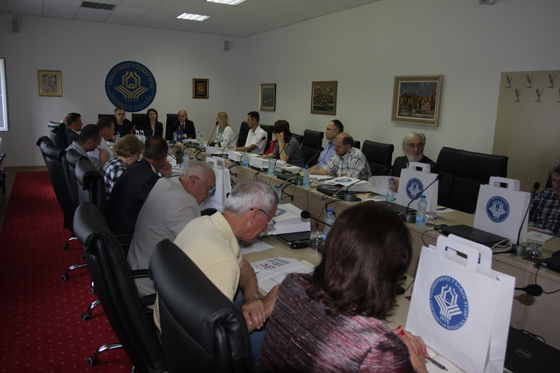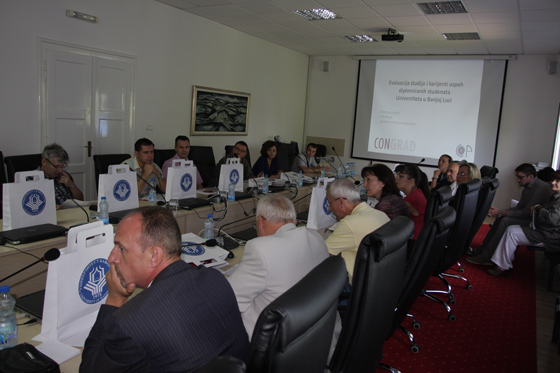Presenting research results on graduate students of the University of Banjaluka
University of Banja LukaGeneralAt the University of Banja Luka, the results of the research on graduate students of the University of Banja Luka were presented, which had been conducted within the regional TEMPUS project – CONGRAD (Conducting graduate surveys and improving alumni services for enhanced strategic management and quality improvement). This is the first project of this kind that is being conducted, in cooperation with four universities from EU (Germany, Czech Republic, Finland, Spain), at the institutions of higher education in Bosnia and Herzegovina, Serbia and Montenegro, with the intention to find out what graduate students think about their study program and how successful they are at getting jobs.
The representatives of the management of University and its faculties, as well as the members of the Committee for providing quality of the University of Banja Luka attended the presentation. The research results and the Project itself were presented and commented by: Prof. Drasko Marinkovic, the Vice-Rector for Human Resources and other issues and the Project coordinator on behalf of the University of Banja Luka, Ms. Jana Nöller, MA, from the University of Bielefeld (Germany), who is the main coordinator of CONGRAD project, and Mr. Predrag Lazetic, MA, from the Centre for Educational Politics in Belgrade (Serbia).
As one could understand from the introductory lectures delivered by Vice-Rector Marinkovic and Ms. Nöller, the final aim of the project is for the institutions of higher educations in the region to use the research conducted on regular basis on graduate students to improve the study programmes, and modernize teaching process and the organization of study programmes. In addition, one of the aims of the Project is to monitor the careers of experts with higher education degrees and thus understand better the process of gradual transition from the world of education to the world of work in the context of countries of the Western Balkans.
When it comes to the University of Banja Luka, it was possible to find out more about the research results from the detailed report delivered by the representative of the Centre for Educational Politics, the research organization that processed and analyzed the data gathered via online questionnaire from March to July in 2013.
2876 students from all faculties of the University of Banja Luka who graduated in 2006/07 and 2011/12 academic years participated in this research. The total response rate was 42%, which means that the graduate students' response was exceptionally good, since the percentage is similar to that achieved in research on graduate students in Europe.
When asked to provide their evaluation of study programmes they graduated from during 2006/07 or 2011/12 academic year, the graduate students of the University of Banja Luka provided highest marks for the cooperation with their peers and the competence of the teaching staff, whereas study programmes got lowest marks in the domain of practical work and the use of contemporary approach in teaching process.
In general, students are satisfied with the study programmes they graduated from. If they had an opportunity to choose a faculty or a study programme again, almost 60% of the graduated students of the University of Banja Luka would choose the same faculty and the same study programme.
Among other things, the participants of the research evaluated the old and new (Bologna) study system, and the evaluation analysis showed that students who studied according to the new study system find that this system offers better possibilities for fulfilling student's requirements in time, organizing exams, professional office hours with the teaching staff related to the teaching contents, communication with the teaching staff and the use of contemporary approach in the teaching process, whereas the work of the Registrar and similar services was evaluated as rather unsatisfactory. These indicators point to the positive effect of the reforms inspired by the Bologna process in some aspects of organization of studies and the quality of study programmes.
When it comes to the employment rate of the experts with higher education degree, it is much lower, as it could be expected, for those who graduated a year or a year and a half a year ago, compared to the employment rate of those who graduated before, which is confirmed by the fact that within five years after the graduation 90% of them were employed.
Generally speaking, the information on career patterns of those who graduated from he University of Banja Luka do not point to the long term unemployment of the young experts. More than 70% of those graduated were employed immediately after graduation. In general, their jobs were related to the fields of their studies.
The research showed that two thirds of the graduate students of the University of Banja Luka get a job in the public sector, whereas one third of them gets a job in the private sector.
As far as the income at the current employment of the graduate students of the University of Banja Luka who graduated five years ago is concerned, the income increase is visible when compared to that of the first significant employment, which confirms that career advancements are followed by income increase when compared to the first-job salaries.
As it could be heard during the presentatioon and during the discussion that followed afterwards, the results of this research are going to be of great importance to all institutions of higher education at which this research was conducted. Except for the fact that they can have the role of a corrective factor in the work of the University and its faculties, this information is going to be of great importance in the process of drafting the future strategic documents for institutions of higher education.


